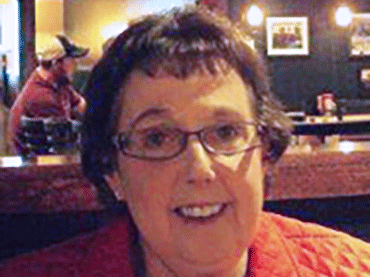Doris Coletta, 61, has been a patient of Sally Wenzel, MD, director of the University of Pittsburgh Asthma Institute at UPMC, since 2007. Doris recently retired after working with the Butler County Department on Aging for 15 years. Although her severe asthma makes breathing a struggle, Doris is determined to live each day to the fullest, with the help of her team of asthma specialists.
The Challenge
Doris lived in Minnesota from 1980 to 1986 while in her 20s. At the time, she thought her asthma was a result of hormonal changes from the recent birth of her son, or from a change in environment in a new house. Doris was hospitalized about three times every year, and always acquired pneumonia during the winter months.
“In the 1980s, people needed a referral to see a specialist, and my primary care physician said that he could control my asthma,” Doris says. “I was on high doses of steroids at different times but still made numerous trips to the emergency room. The treatment back then for an asthma attack was to inject epinephrine, otherwise known as adrenalin." (Historically, epinephrine was used to treat severe acute asthma attacks following the failure of standard therapies.)
Before moving to the Midwest, Doris lived in the Green Tree area of Pittsburgh. When she came back to Pennsylvania in July 1986, she moved to Butler County, where she lives today. In 1993, Doris was referred to a pulmonologist in Butler because her asthma was becoming more severe. However, even under the care of a specialist, Doris’ condition did not improve, because the course of treatment was similar.
The Path to UPMC
In a 10-year span, from September 2000 to March 2010, Doris continued to treat her asthma with oral steroids, but was hospitalized 24 times. In 2006, hoping to provide her with a broader range of treatment options, her physician referred her to the UPMC Comprehensive Lung Center, where she first was seen by Dr. Sally Wenzel. In April 2007, Doris received a right lung biopsy, and two years later, she had a bone marrow biopsy in an attempt to determine the cause of her severe symptoms. A key component of the Asthma Institute’s care model is a thorough evaluation to rule out other types of diseases.
Doris’ long term use of steroids caused her to experience severe acid reflux, and trouble sleeping. In September 2012, she had surgery for acid reflux, and no longer has any heartburn symptoms.
Doris’ immune system is compromised in many ways beyond just her asthma. She also suffers from rheumatoid arthritis. Treatment with infusions of abatacept and infliximab made no significant improvement in the inflammation from her asthma or arthritis.
Her immune (gamma) globulins are also lower than they should be, likely as a part of her disease. Doris continues to receive intravenous immunoglobulin every two weeks to ward off infection-induced asthma symptoms that can occur because of her poorly functioning gamma globulins.
Like many asthma sufferers, Doris tried many types of treatments, and even participated in trials of new types of drugs, with mixed results. But it was through careful evaluation, and the persistence of her team at the Asthma Institute, that she eventually was able to gain some control over her symptoms.
The Solution
Although Doris’ asthma is severe, her regimen today includes a variety of measures to help maintain her quality of life. Despite her improvements, she still uses her inhaler and nebulizer often. She receives treatment with intravenous steroids three to five times a week, and the number of times she has been hospitalized has dramatically declined.
“I am so grateful that the Asthma Institute allows me to get the intravenous steroids on an outpatient basis,” says Doris. She credits Dr. Wenzel and her team for the progress that she’s made. “The Asthma Institute has given me hope because I’m determined to not let asthma control my life.”
Doris is focused on doing activities she enjoys, including working in her yard, reading, cooking and baking, and exercising more. Despite her struggle with breathing, even with small tasks such as carrying grocery bags or laundry, she remains optimistic.
“Now, even though it might take me a little longer, I can do all of the things that I want to do," Doris says.
Doris’ treatment and results may not be representative of all similar cases.
















